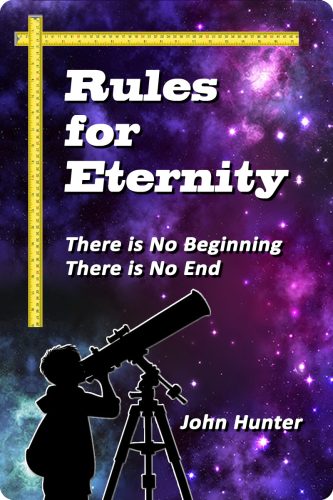 About Rules for Eternity by John Hunter:
About Rules for Eternity by John Hunter:
Every aspect of our existence is controlled by Rules or Laws. Some of these Rules can be broken, with varying degrees of consequence. Invariably, these transient Rules are man-made. They can relate to a Continent, a State, or even attempt to define the minute constraints on where we might walk, sit, or smoke. There are other Rules that must be obeyed without question, and there is not an opportunity to manoeuvre outside their restrictions, no matter how serious the intent. These unbreakable or Immutable Rules come from a higher authority, and are very much the focus of this book.
Many grey areas exist due to incomplete knowledge and understanding of the immutable rules. Identifying the exact scope of these rules will have a profound influence on the future directions available to Science. In the past, science-fiction writers have done a wonderful job of forecasting many advances in many fields of endeavour. Perhaps there is no better example than Arthur C. Clark, who first defined the Geostationary-Orbit, and clearly saw the place it would have in our technological future. But, in some cases, these same writers may possibly have done a disservice in creating a bar that might be too high to reach. There is a growing expectation that, given enough time, humans can do anything. While that attitude is to be admired, is it realistic? The purpose to this exploration of the Rules is hopefully to provide a reality-check on what is achievable, and what is pure fiction.
A requirement for seeing into the future is a solid understanding of the current rapidly expanding knowledge-base. It would be an utterly false expectation if we imagined we would ever be allowed or enabled to see the whole picture. Our entire world is but a pixel on the postage-stamp applied to an infinite universe. If we managed to eventually blow planet Earth back to a chaos of atoms and molecules, the effect would be less than a leaf-shake in the forest of our nearest galactic neighbours. To examine the Rules to their fullest extent will require extrapolation way beyond our observable world. Once outside the observable event-horizon, we are squarely in the realms of Philosophy. In this book, we do go there, and make no pretence otherwise.
Buy the book:
Author Bio:
John was raised in regional Australia, where an uncluttered lifestyle provided ample opportunity for hands-on exposure to the wonders of nature. At the University of Melbourne he took out an honours degree in Science, thus qualifying as a Particle Physicist. Although he was well-qualified and enthusiastic, it soon became apparent that nuclear-phobic Australia offered quite limited career prospects in that field. He then completed a second degree in Electrical Engineering.
For several years John worked with Schlumberger as an oil engineer, before retiring to coastal Queensland where he established a small electronics business. It was not commonly known, but this business was purely a front to facilitate his desire to invent things. His proudest achievement was possibly the Computaphon, the world´s first electronic phone.
None of John´s inventions was ever commercialised as he expressed little interest beyond building prototypes and proof-of-concept. He later gravitated to software development, a pursuit which continues to this day. However, none of these ´day jobs´ managed to overshadow his fundamental love –- Cosmology.